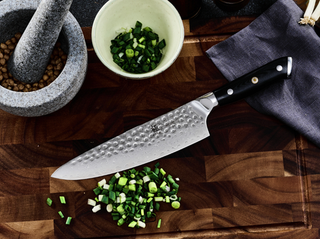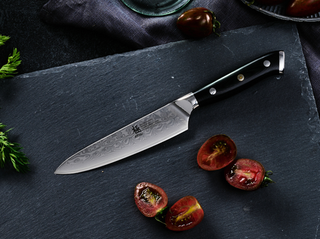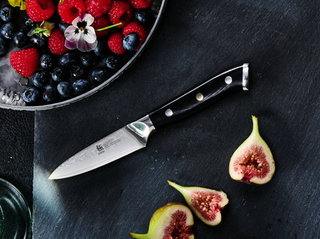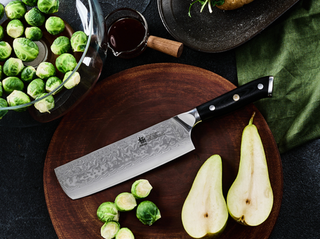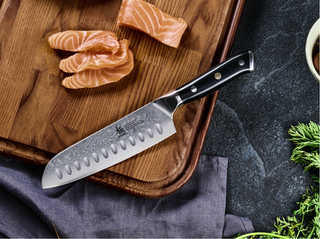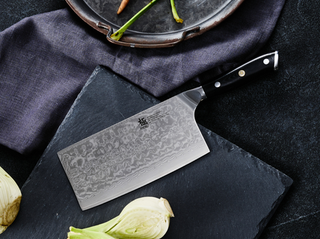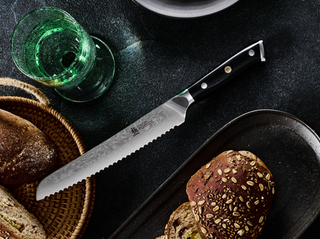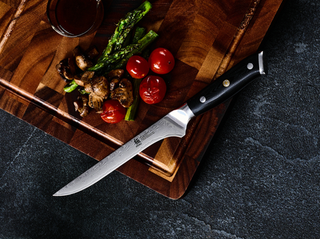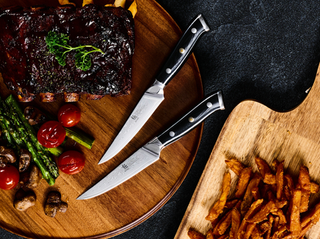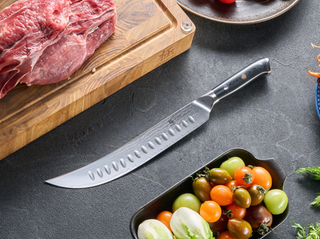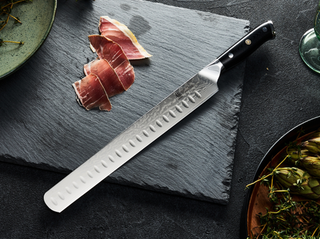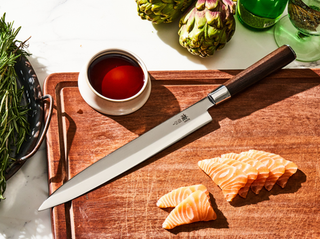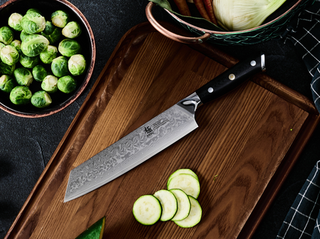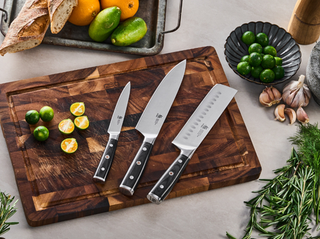
Imagine a knife so sharp it can split a hair lengthwise. That's what we're talking about when we look for the sharpest knife in the world.
But here's the thing: the answer isn't as simple as picking one knife off the shelf. Let's break down what really makes a knife sharp and find out which ones truly deserve the title of "sharpest knife in the world."
1. What Do We Mean By "Sharp"?
When scientists talk about sharpness, they're looking at something too tiny for our eyes to see. They measure the edge of a blade in micrometers - that's even smaller than a human hair.
The sharpest edges humans have ever made are actually just a few atoms wide.
But before you rush to buy one, there's something important to know: these super-sharp edges are often too delicate for everyday use.
2. The Sharpest Knife in the World: Lab-Made Diamond Blades
The sharpest knife in the world isn't something you'll find in your kitchen.
It's a special diamond blade made with pure diamond, created in a laboratory. These knives can achieve edges just 3 atoms wide!
But there's a catch. These ultra-sharp diamond blades:
-
Cost thousands of dollars to make
-
Break very easily
-
Can only cut very specific materials
-
Need special handling and care
This is why you won't find them in stores or professional kitchens.
The Truth About Traditional Super-Sharp Materials
You might have heard about obsidian blades being incredibly sharp. And it's true - these volcanic glass knives can reach molecular-level sharpness.
But there's a big problem: obsidian is extremely brittle. Drop it once, and it shatters. Try to cut something tough, and it breaks.
This is why surgeons only use obsidian scalpels for very specific procedures where ultra-precise cuts are needed.
3. What About Knives We Can Actually Use?
While laboratory-made diamond blades might be the sharpest knife in the world technically, they're not practical for actual use.
For knives we can use in real life, Japanese knives have come closest to extreme sharpness.
The blades of the best japanese knives can reach angles of 10 degrees - that's about three times sharper than most kitchen knives.
These Japanese knives combine:
While Japanese knives aren't technically the sharpest knife in the world, they've mastered something more important - the perfect balance between extreme sharpness and everyday usability.
Think about slicing a ripe tomato. A laboratory diamond blade might be sharper, but it would shatter on contact.
A Japanese high-carbon steel blade, however, gives you that satisfying "straight-through" cut while still being tough enough for daily use.
If you’re interested in the tradition of Japanese knives making, click here to read more.
What Should You Actually Buy?
For most home cooks, the sharpest knife in the world would be overkill. What you really want is a knife that's:
This usually means a high-quality stainless steel knife with a hardness between 58-60 on the Rockwell scale.
Let's look at three professional-grade options that deliver that perfect balance:
The Shogun Series Gyuto might not be the sharpest knife in the world technically, but it comes impressively close while remaining practical.
With its 8-12° edge angle (remember, most Western knives are 20°), this knife achieves remarkable sharpness that actually lasts.
What makes this knife special:
-
67 layers of Damascus steel (that's what gives it those beautiful wave patterns)
-
Edge hardness of 58-60 HRC (that's approaching the theoretical maximum for practical steel)
-
Traditional Honbazuke 3-step sharpening process
-
Perfect balance of sharpness and strength
The Gin Series Santoku takes a fascinating approach to the pursuit of sharpness.
While maintaining that razor-like 8-12° edge angle, it adds something unique: an ionic silver coating that not only helps maintain the edge but also provides antimicrobial properties.
This knife:
-
Uses VG-10 steel (one of Japan's most advanced knife steels)
-
Maintains its edge longer through cryogenic treatment
-
Weighs just 9 oz for precise control
-
Perfect for those who value precision over power
Now, if you want to experience how extreme sharpness transforms heavy-duty cutting, the Shogun Series Cleaver is your answer.
It proves that even a larger blade can maintain the kind of edge usually reserved for smaller knives.
This cleaver stands out because:
-
Its wide blade features the same 8-12° edge angle as its smaller siblings
-
The Damascus pattern actually helps prevent food sticking
-
Despite its size, it maintains delicate precision
-
G10 fiberglass handle balances the substantial blade perfectly
Why These Knives Matter
Remember how we talked about the "sharpest knife in the world" being too delicate for real use?
These knives solve that problem through advanced metallurgy and time-tested Japanese craftsmanship.
They deliver professional-level sharpness that you can actually maintain in a working kitchen.
5. The Right Way to Keep Your Edge
Keeping a sharp edge is actually pretty simple. You just need to:
-
Store your knife properly - use a knife block or magnetic strip, never loose in a drawer.
-
Clean it right away - just warm water and mild soap, then dry it immediately.
-
Use the right cutting board - wooden cutting boards are your best friends.
6. Conclusion
Yes, laboratory-made diamond blades technically hold the title of "sharpest knife in the world." But these ultra-sharp edges are too delicate for any real cooking.
This is where Japanese knife craftsmanship changes the game.
By mastering the balance between extreme sharpness and practical durability, Japanese knives deliver something more valuable than pure sharpness - they give you an edge that's razor-sharp yet tough enough for daily use.
Think about what matters in your kitchen. You don't need a knife that can split atoms. You need one that glides through ingredients, maintains its edge, and becomes a trusted tool in your cooking journey.
Because at the end of the day, the best knife isn't the sharpest knife in the world. It's the one that makes every cut cleaner, every prep easier, and every meal better.
FAQ for the Sharpest Knife in the World
Q1: What exactly does “sharpness” mean when it comes to knives?
Sharpness refers to how fine and narrow the blade edge is, measured in micrometers or even atoms wide. A sharper edge allows more precise and effortless cutting but can be delicate.
Q2: Why aren’t the sharpest diamond blades used in kitchens?
Diamond blades made in labs are ultra-thin and sharp down to a few atoms but are extremely fragile, expensive, and suitable only for specialized industrial or medical uses, not everyday cooking.
Q3: How do Japanese knives balance sharpness and durability?
Japanese knives use advanced steel formulas, traditional forging, and hand finishing to create blades that achieve very sharp edges (8-12° angle) but remain tough and practical for home and professional kitchens.
Q4: What care is needed to maintain a sharp knife edge?
Proper storage, immediate cleaning with mild soap and water, drying, and using wooden cutting boards help preserve the sharp edge. Avoid letting knives loose in drawers or cutting on hard surfaces.
Q5: Which knife hardness is ideal for balancing sharpness and usability?
A hardness between 58-60 on the Rockwell scale is considered the sweet spot, providing an edge that is both sharp and durable enough for daily cooking tasks.
Q6: Are there special knives recommended for different cooking needs?
Yes, for example:
-
-
7” Santoku for precision tasks, featuring antimicrobial coatings.
-
Hello, my name is Edward Thompson and I'm a writer who loves Japanese food and culture. I went to a great cooking school in New York and have been to Japan several times to learn more about Japanese cooking and knife culture. I know all about Japanese knives, from their history and how they're made to how to use them.
